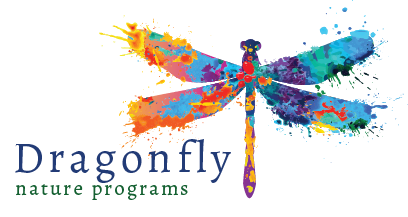Meet Charlotte, our K-3 program specialist. Every nature study will meet the NCSCOS in science, supporting the teaching and learning in your public or private school classroom.
We are now accepting reservations for in-school field trips for the 2023-24 school year.
Scroll to learn more. Pricing information is listed at the bottom of this page.
“It is our intention to thoughtfully craft every program to meet the developmental needs of each age group.” -Rachel Woods & Charlotte Saylor
Kindergarten
Kindergartners are affectionate and excited to learn. Our playful kindergarten programs take into account their shorter attention spans and their need for learning through play.
Junior Zoologists
[K.L.1.1-1.2] Through play & careful observation, students will be introduced to native NC animals while learning to classify animals structurally & behaviorally. Learning about animals teaches students a lot about themselves & our environment!
*May include live animals
Puddle Jumpers
[K.E.1.1.2-1.3] Weather events are not random but connected to the environment and effects multiple aspects of our lives. From thunderstorms to snowflakes to rainbows, this is a great introduction to some important scientific concepts as weather is a great entry point into the study of science.
Grade 1
First graders are very curious about the world and ask a lot of “what if” questions. Our 1st grade programs encourage guided discovery knowing their improved fine motor skills and improved ability to follow directions will support their learning and their big “what ifs.”
Soil Rocks!
[1.E.2.1-2.2] Students will investigate the physical properties of rocks and soil. This “dirty” nature study guides learners through a hands-on investigation of our physical world, making connections between rocks, soil and our own lives.
Home Sweet Home
[1.L.1.1-1.3] A deciduous forest is a local ecosystem made up of various habitats to fulfill the vital needs of a diverse range of living things. We bring these habitats to you and give students time to dig in to the curious differences between each habitat.
*May include live animals/restricted availability due to material requirements. Please schedule August-October or March-May only.
Grade 2
Second graders are achieving more independence, and are better able to make comparisons between two concepts. Our 2nd grade programs allow learners to see themselves as a part of the natural world and asks students to compare the adaptations and lived experiences of native plants and animals.
Cycles
[2.L.1-1.2] A program that goes beyond the life of a butterfly & introduces the intriguing lives of other native organisms. Through birth, development & adulthood, plants and animals live complicated lives which we will celebrate during this investigation!
*May include live animals/restricted availability due to material requirements. Please schedule August-October or March-May only.
Now Hear This!
[2.P.1.2] Hearing is vital to survival & a challenge to understand. This nature study explores our human sense of hearing then dives deeper into hearing adaptations of local animals. This lesson is hands-on, playful & will spark curiosity & understanding!
Grade 3
Older and wiser, third graders are able to see a whole system better than their younger peers. Our third grade programs take a whole picture perspective while still allowing these young learners to consider each part of the whole independently.
Flower Power
(3.L.2.1-2.2) This nature study will introduce students to the vital relationships between pollinators & flowers. Students will study basic flower anatomy and the process of pollination through interactive investigations. It is sure to BEE fun!
Skin Deep
(3.L.1.2) Skin is the largest organ in the human body & serves as our body’s primary protector. But in that regard, it is not unique from the body coverings of other organisms. This popular nature study asks students to investigate their own body covering, and question the similarities of the integumentary body system across many different types of animals.
*May include live animals.
Pricing & Additional Information
Dragonfly strives to provide a thoughtful, age appropriate and hands-on learning experience at an affordable price: $135 per class with 20 or fewer enrolled students; for classrooms with more than 20 students, add $9 for each student over 20
Classes may not combine; each class is taught separately
Prices are not subject to change due to changes in attendance on the day of programming
Payments are accepted at the time of service but clients have 30 days to fulfill an invoice.
Payments can be made by check or credit card (a 2.95% convenience fee is charged for credit card transactions only)
In-house nature studies run approximately 60-70 minutes
Teachers are expected to remain with students & manage behaviors
Dragonfly Nature Programs is a for-profit business however we NEVER want affordability to limit our reach. If you know of a school that would benefit from our services but cannot afford full price programming, reach out to Rachel @ 919-274-3750. Accommodations can be made.
Are you unsure if our programs are right for your school community?
Read what others think on our testimonials page.
Forms
Some of our programs include live animals. For more information check out: WCPSS Animals in Schools Board Policy
Parents are a big partner in their child’s education. If there are concerns about the use of animals in programming, here is an option for you: Parent Opt Out Form-animals in schools
Our programs are designed by a state licensed, veteran science teacher. As such, each program meets the standards teachers are entrusted to teach and students will be tested on: NCSCOS Science Grades K-5










